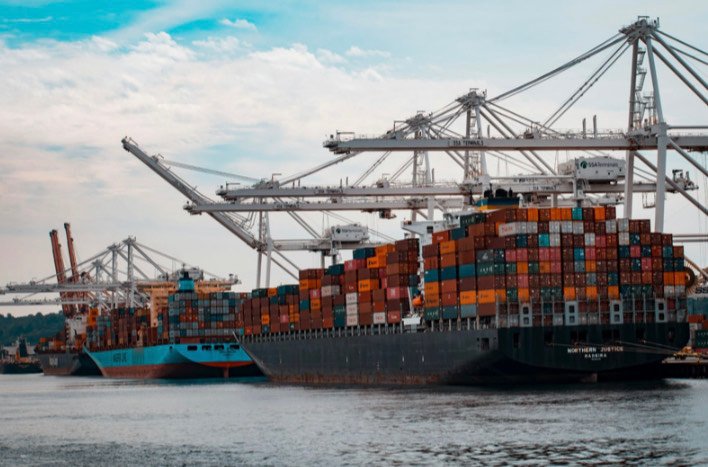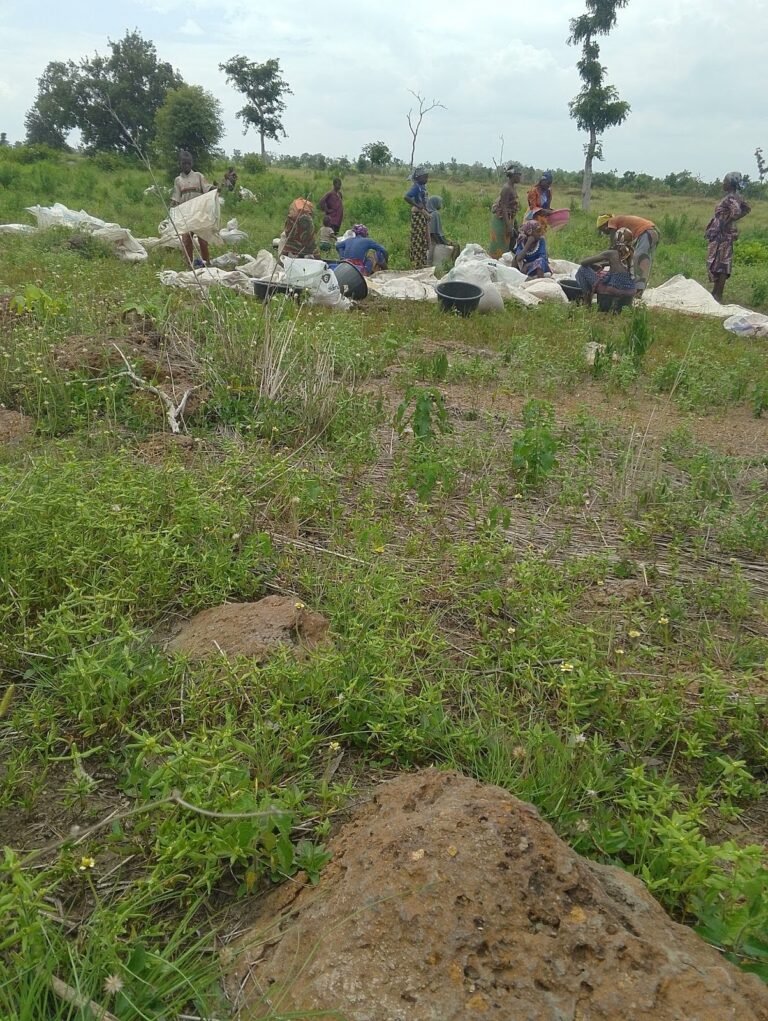Emmanuel Emuoborsan stood holding a video recording device in his hand, visibly agitated. In a monologue (archived here) posted on his TikTok account, he expressed disappointment in what he believed was another hasty and harsh decision by the Nigerian government: a blanket ban on all foreign goods.
“I just say make I quickly react to the report that the President of Nigeria don sign executive order say anything wey we dey produce for Nigeria, make dem stop to dey import am. I no understand how government go just bring that kind law sharp sharp” he said in a mix of English and Pidgin.
He continued: “Look rice,” reminiscing about the aftermath of the last import ban implemented by former President Buhari, “from ₦6,000 to ₦120,000. Now na ₦85k, ₦75k. And dem still dey drive Japanese cars for National Assembly.”
Emuoborsan’s frustration is understandable. But his outrage, like many others, is based on a misinterpretation. What he reacted to was not a nationwide import ban, but a more specific directive: a prohibition of government institutions from buying foreign goods where corresponding local products are available.
The News and Misrepresentation
On Monday, May 5, 2025, Mohammed Idris, Nigeria’s Minister of Information and National Orientation, announced a policy tagged “Nigeria First,” which mandates government agencies to prioritise locally produced goods in procurement when those goods are locally available. This announcement does not affect individual or commercial importation.
The announcement’s wording, as read by the Minister in a 7-minute video, leaves no doubt about who the directive is aimed at. He said: “Where there is the possibility of getting local manufacturers to supply any kind of goods or procure any kind of services, there will be no need for MDAs to now procure these goods or services from outside this country.”
Speaking about the provision for sanctions for any institution that breaches the directive, Mohammed stated that the breaches would lead to “cancellation of procurement processes by such MDAs and disciplinary action against responsible officers.”
Unfortunately, several mainstream media platforms ran with headlines like “Tinubu Bans Importation of Foreign Goods” as we have here, here, and here. Though many provided accurate details in the body of the article, the headlines alone shaped public understanding.
For readers like Emuoborsan, the damage had already been done, adopting the belief that the government is “implementing bad policies” and is “inconsiderate of the poor.”
Headline screenshot wrongly depicting the ‘Nigeria First’ policy as a blanket import ban
Emuoborsan is not alone. A study by Penn State University researchers revealed more than 75 percent of social media users do not read beyond the headlines. In Nigeria, that is about 28 million of the over 36 million social media users.
One of those who also believed the government had issued an outright ban on importation is an X user, Shehu Gazali Sadiq (@Shehusky). Shehu wrote (archived here), “Buhari, the dullest president of Nigeria, banned importation of foreign goods as a solution to our economic woes, and it didn’t work. Another dullard, Tinubu, is doing the same. When you put illiterates in power, this is what you get. No thinking, no creativity, no innovation.”
As of June 23, this post has garnered 647 reposts, over 23,000 views, and over 1,300 likes.
Reacting to the People’s Gazette’s headline post on X that reads “Tinubu bans importation of foreign goods, unveils new industrial policy,” Ochichi (@_Ekezie), an X user, wrote (archived here), “The economy is now fully in the hands of smugglers. Without effective plans on the ground. That’s how he denied fuel subsidy removal after removing it without any plans on the ground. That’s how they keep denying the electricity subsidy removal after removing it without any critical plans on the ground. He will also deny banning the importation of foreign goods after he brings the economy to a standstill and the poor begin to cry like frogs in boiling water. T-Pain, keep on strumming Nigerian pain.”
This kind of public reaction reflects a deep crisis of trust in government, exacerbated by how the media presents policy news.
“When headlines are misleading, it doesn’t speak well of the organisation. Over time, audiences lose trust, even when those outlets begin to publish accurate reports,” said Lekan Otufodunrin, a media accountability advocate and a director at the Media Career Development Network.
But this is also not the first time media outlets have sensationalised news, using misleading headlines that distort facts and spread misinformation. A notable case is the widespread misreporting in 2024 of the lawmakers’ role in proposals for state creation.
Several major news platforms published headlines that suggested members of the House of Representatives were actively pushing to create 31 new states. For instance, Channels TV (archived here) ran the headline “House of Representatives Proposes Creation of 31 New States,” while BBC Pidgin (archived here) published “State Creation: Full list of 31 new states wey House of Reps propose.” Such headlines gave the audience the impression that lawmakers were sponsoring official legislation to redraw Nigeria’s political map.
In reality, the lawmakers simply fulfilled their constitutional obligation: transmitting petitions submitted by citizens and interest groups during the constitutional amendment process. These proposals did not originate from the lawmakers and had not passed any legislative stage.
A statement issued by House Spokesperson Akin Rotimi clarified that the House was not proposing the creation of new states but had received 31 submissions requesting such. These were submitted as private member bills and do not reflect the official position of the House.
Deputy Speaker, Benjamin Kalu, who chaired the Constitution Review Committee, explained during plenary that the submissions would be assessed strictly in line with the constitutional requirements under Section 8, subsection 1 of the Nigerian Constitution.
Headline screenshot wrongly depicting the ‘Nigeria First’ policy as a blanket import ban
On the other hand, headlines such as “’Aba, Lagoon, Warri’ — reps receive proposals for creation of 31 new states” (TheCable) and “Constitution Review: Reps panel receives 31 requests for new states’ creation” (Premium Times) offered more accurate context.
Headlines Spreading a Lie
Minutes after the Minister of Information announced the federal government’s “Nigeria First” directive on Monday, May 5, 2025, the internet lit up with headlines that distorted the true scope of the policy.
We traced 237 posts (archived here) using advanced Google search tools, including shares and reposts on social media platforms such as Facebook, Twitter, Instagram, TikTok, and YouTube. While many posts were sourced from online blogs and personal accounts, analysing the media landscape revealed that the following ten media organisations, all legally registered with the Corporate Affairs Commission in Nigeria, published identical misleading headlines.
A structured table summarising the misleading headlines and relevant details about each media organisation that published them
Across Facebook, X, and YouTube, the ten registered media outlets that pushed the misleading headlines hold significant sway over Nigeria’s digital news landscape. These platforms reach more than 17 million followers across the three channels. Their cumulative audience on Facebook is over nine million, with Legit.ng (2.9 million), AIT (1.7 million), and Daily Post (1 million) leading the pack.
On X, their presence draws over six million followers, and Daily Post, AIT, and Peoples Gazette command hundreds of thousands. YouTube adds substantial weight with TVC News (1.3 million) and TV360 (211,000) standing out.
In most cases, the virality of the false framing was exacerbated by the click-first, verify-later culture dominant in Nigerian media, where headlines are optimised for engagement, not clarity. Most damaging, however, was the credibility associated with the legally registered news media against online blogs running solely to generate clicks.
Headline screenshot wrongly depicts the ‘Nigeria First’ policy as a blanket import ban.
Lekan says this trend reflects deep ethical issues within Nigerian journalism.
“There is no justification for exaggerated or misleading headlines. The headline must reflect exactly what the report is about,” he said.
“Sometimes, it’s just clickbait, and it’s unethical. If readers feel deceived, they may never come back,” he added.
Meanwhile, media outlets like Africa.com wrote a more accurate headline: “‘Nigeria First’: Abuja Bans Imported Goods for Government Agencies” Other outlets like Vanguard published with the headline “Tinubu bans procurement of foreign goods produced locally.”
While this is not the first time the media has misrepresented information from government officials, the government often rebukes such misrepresentation. A notable example occurred in July 2024, when Daily Trust published a controversial report titled: “LGBT: Knocks As Nigeria Signs $150 Billion Samoa Deal”
The report alleged that the Nigerian government had signed the Samoa Agreement, an international partnership with the European Union, which included clauses promoting LGBTQ rights.
The news quickly spread across social media platforms. It caused widespread backlash from religious organisations and civil society actors, many of whom accused the government of compromising national values protected under the Same-Sex Marriage (Prohibition) Act.
Lekan attributed this recurring problem to the collapse of newsroom internal quality control structures.
“Writing is an art,” he said. “We used to have trained sub-editors and copy editors who would read through stories carefully and craft accurate headlines. Nowadays, someone just reads the first paragraph and slaps on a headline.
“Ultimately, editorial responsibility lies with the editor-in-chief or whoever is in charge of the platform. They must ensure that headlines are creative but not misleading.”
Three days after the Daily Trust misrepresented the Samoa Agreement, on July 7, 2024, the Federal Government officially responded to the report. In a press conference, the Minister of Information and National Orientation, Mohammed Idris, condemned the Daily Trust publication, describing it as inaccurate and dangerous.
“We, however, did not envisage that Daily Trust and people behind it could descend to the reckless level of attempting to set the country on fire by falsely accusing the government of signing a deal to promote LGBTQ,” Mohammed said.
“We found that despicable and wicked because the allegation is nowhere in the document signed. Surprisingly, the paper put forward no evidence nor provided the agreement allegedly signed to prove their point.”
Following the backlash and clarification, the Federal Government filed a formal complaint with the National Media Complaints Commission (NMCC), which later reviewed the case and found Daily Trust at fault for misreporting. The paper was directed to issue a retraction and a public apology.
However, despite the virality of the misrepresentation of President Tinubu’s “Nigeria First” policy, the government has turned a blind eye. One reason, as our analysis reveals, is propaganda.
The Propaganda
Shortly after the misleading headlines surfaced on May 5, 2025, the misrepresentation caused some people to condemn the policy. Shortly after this, social media was awash with praises from pro–Nigeria First policy supporters, many of whom began projecting exaggerated economic benefits of the announcement. Unlike past media sensationalism that sparked criticism and forced government clarifications, this wave of misinformation cast the administration in a positive light.
Among the supporters were the Manufacturers Association of Nigeria (MAN), the Nigeria Employers’ Consultative Association (NECA), and Senator Ali Ndume, a lawmaker in the Senate, who issued statements hailing the “Nigeria First” directive. They also introduced additional claims and exaggerated projections that further muddied public understanding of the policy, and the media published them without verification.
But “journalism must rise above propaganda,” Lekan argued. “Our role is not to echo power, but to inform the public accurately and responsibly,” he added.
NECA and Ndume
In a press statement, Adewale-Smatt Oyerinde, Director General of NECA and Chief Executive Officer of the association, lauded the policy, calling it a great move, “a strategic economic imperative.”
“Over the past few years, we’ve urged the government to prioritise the patronage of made-in-Nigeria goods, as this will not only promote local production but fundamentally reduce the pressure on forex demands, stimulate local industrial growth and facilitate job creation and preservation among others,” Adewale-Smatt said.
Also, Senator Ali Ndume, who represents Borno South, stated on May 6, 2025, “It is heartwarming to hear that President Tinubu has boldly decided to ban imported goods that can be produced locally. This will be a major boost for Indigenous businesses amid the slipping Nigerian economy.”
He claimed that with the protection of local industries, there will be employment for “our employable youths” and the value of the Naira will appreciate.
But since MDAs account for only a small fraction of total demand in an economy of over 200 million people, analysis shows the scale of impact referenced by Adewale-Smatt could only be remotely achievable if the policy targeted the entire country. While the duo did not cite specific figures, their remarks gave the impression that a sweeping, economy-wide shift had occurred, the type akin to a nationwide import ban.
Fact-checking MAN’s Claims
In a separate statement, Segun Ajayi-Kadir, Director General of MAN, praised the policy as a “long-awaited relief to resilient Nigerian manufacturers.”
He said, “We see this initiative as a true and definite demonstration of the government’s commitment to promoting local industries, boosting economic growth, and creating jobs for Nigerians. The effective implementation of such an initiative… would scale investments and potentially boost GDP by 56 percent, reduce unemployment by 37 percent, and increase firms’ willingness to employ from 1.5 percent to 22.6 percent.”
The Liberalist looked into these claims to find their basis and economic reality.
Claim 1: The “Nigeria First” policy can grow Nigeria’s GDP by 56 percent
Verdict: Misleading. The claim is not supported by evidence and is inconsistent with global economic trends and credible expert forecasts.
GDP, or Gross Domestic Product, represents the total annual market value of all goods and services produced in a country. According to World Economics, Nigeria’s nominal GDP is estimated at $375 billion in 2024, and a 56 percent increase would require the economy to grow to nearly $585 billion, an unprecedented leap of more than $210 billion.
Meanwhile, according to World Economics projections, Nigeria will have a $387.1 billion GDP in 2025, a modest growth of just 3.2 percent. On a more positive outlook, the World Bank forecasts a slightly higher 3.6 percent GDP growth in 2025, citing improvements in oil production and domestic economic activity.
Even the policy structure does not support the scale of growth being claimed. The “Nigeria First” directive applies only to MDAs, whose procurement budgets account for a small slice of national spending. A review of the 2025 Appropriation Act shows the federal capital and procurement budget stands at ₦23.44 trillion, out of a total appropriation of ₦54.99 trillion. Compared to Nigeria’s estimated $375 billion GDP in 2024, approximately ₦562.5 trillion at an exchange rate of ₦1,500 to $1, the entire capital and procurement spending accounts for roughly 4.2 percent of GDP.
Even if every naira of that budget were exclusively used to purchase locally produced goods in a highly optimistic scenario, the scale of public procurement is too limited to catalyse the type of broad-based economic expansion needed to raise GDP by over 50 percent.
Bello Audu, an Innovation Economist at Usmanu Danfodiyo University, Sokoto, explained that while the policy may spur growth, its impact is impossible to match the hype. More than procurement policies, he argued, Nigeria needs a secure environment and strong legal institutions to boost its GDP.
“You cannot grow GDP [in this manner] in a country plagued by insecurity,” said Dr. Audu. “The procurement policies can grow GDP, but boosting it by 50%? That’s not achievable.”
Claim 2: The policy can cut Nigeria’s unemployment rate by 37 percent
Verdict: Misleading. The implied scale of job creation is implausible given the policy’s limited reach.
Unemployment refers to the share of the labour force that is willing and able to work but cannot find a job. As of the second quarter of 2024, the National Bureau of Statistics (NBS) reported that Nigeria’s official unemployment rate had declined to 4.3 percent, down from 5.3 percent in Q1 2024, based on the revised labour force methodology introduced in 2023.
Using the Q2 2024 figure of 4.3 percent as a baseline, a 37 percent reduction would mean pushing unemployment down to approximately 2.7 percent, a level that borders on full employment, where nearly everyone seeking work has a job. In practical terms, this would require the creation of at least 1.5 to 2 million new jobs, based on a labour force of roughly 88 million Nigerians.
No study suggests that a procurement directive limited to federal MDAs could achieve this. Moreover, evidence from a 2024 PwC Nigeria report shows that over 80 percent of jobs in Nigeria are created by micro, small, and medium-sized enterprises (MSMEs), many of which operate in the informal sector and are loosely (if at all) influenced by federal procurement policies.
This stance is corroborated by Bello, who told The Liberalist that “unemployment may gradually decline if local firms are supported to sell more, produce more, and hire more. But to achieve such reductions [37%], it would take decades.”
He added that exaggerating a policy’s benefits creates false hope and misleads the public into supporting it. In Nigeria, he noted, this pattern has repeated itself often, and it’s why people have lost confidence in governance.
“If people believe the government is constantly exaggerating, they stop trusting policies no matter how good the intentions are. That is a major risk to national development,” said Bello.
Efforts to obtain a reaction from the Ministry of Information and National Orientation yielded no results. A message sent via the Ministry’s official X (formerly Twitter) account was unanswered, and an inquiry submitted through the contact form on its official website has also not yielded a reply as of the time of filing this report.
The headline misrepresentation of the “Nigeria First” policy deepened government distrust and provided fertile ground for propaganda. Since “we are in the age of data, journalists can no longer report at face value,” says Lekan. “We must interrogate official narratives, not just amplify them. If media houses adopt the ethics of accuracy and fairness, we’ll do better as an industry.”















